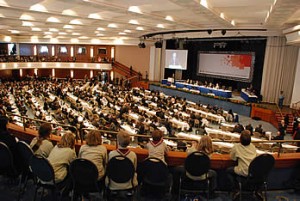AWG-KP intervention:
Thank you chair. My name is Camilla and I am 23 years old. For us, the outcome of the Kyoto Protocol negotiations in Durban was extremely disappointing. All Annex I parties should have led by example and taken on ambitious, legally binding commitments to forge a firm foundation to a sustained global multilateral rules-based system. One that would effectively mitigate climate change based on the principles of equity, historical responsibility, and common, but differentiated responsibilities.
However, all is not lost. We still have this year to decide on robust rules to maximize ambition and we call on willing parties to take on necessary decisions to implement them. During this time, there is one word in particular that young people are thinking about. We would like you in the room to take a moment, a deep breath and consider the word ‘ambition’.
First, we need ambition to ensure that the highest possible emission reductions can be realized. Therefore, in light of the current weak pledges, we call for a 5-year commitment period, so as not to lock ourselves into low reduction targets, giving sufficient space to review our current ambition, and push ourselves further.
Second, we need ambition to ensure the integrity of emissions reductions. Annex I parties must endeavour to make real emissions reductions, and relinquish using loopholes and other methods of creative emissions accounting.
Third, we need ambition to honor the promises that you have made. We need you to wholeheartedly sign on to the second commitment period to fulfill our ambition – not to back away without even fulfilling your emissions reductions from the first commitment period, and certainly not to back out of the protocol altogether. Your ambition can lead by example, and inspire trust in others for a process that does not have to be condemned before it has been fulfilled.
Now is the chance for climate leaders to bring ambition to the forefront. The continuation of the Kyoto Protocol has incredible potential and cannot be compromised; the ambition from all developed countries in this room is essential to realising this potential. Kyoto’s best practices can serve as an inspiring framework for future climate regimes to be built upon. Giving up on Kyoto sends the wrong message to young and future generations and delays the sustainable and equitable future we are all fighting for. High ambition now is our only option.
Thank you.



